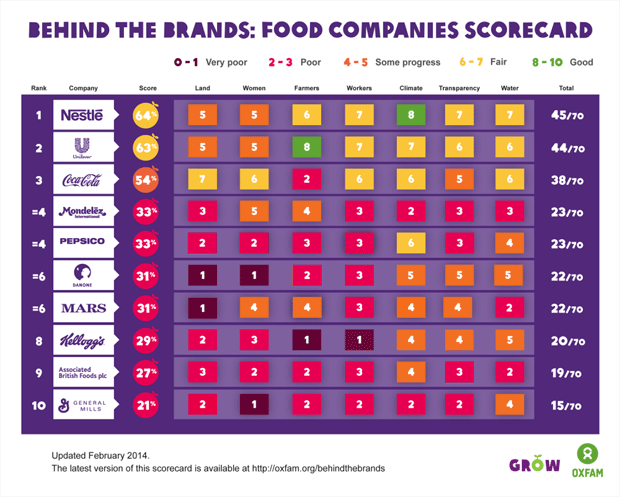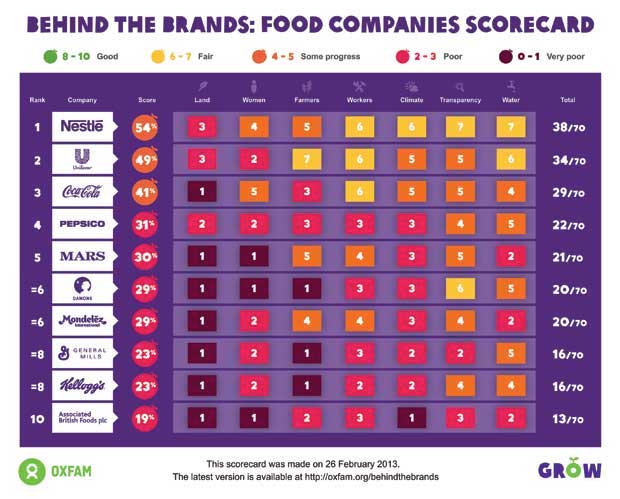Behind the Brands: Food companies do care what consumers think
When customers speak, businesses listen. It’s an old adage in business that Oxfam and its supporters tested to see if this would be true on issues of sustainability and human rights.
We launched the Behind the Brands Scorecard a year ago, to highlight issues in the supply chains of the Big 10 food and beverage companies: Associated British Foods, Coca-Cola, Danone, General Mills, Kellogg’s, Mars, Mondelez, Nestle, PepsiCo, and Unilever.
Women and cocoa – What happened?
First we asked the 3 biggest chocolate companies, Mars, Mondelez and Nestle to address the inequality and injustices that women cocoa farmers and workers faced in their cocoa supply chains. In most countries women play a vital role in agriculture, in some countries representing as much as 80% of the workers in agricultural, yet they too often face unequal pay, lack of promotions, training and access to resources like credit or land.
We, along with 100,000 supporters called on the three chocolate companies to conduct human rights impact assessments to understand what was happening to women in their supply chains and then develop plans of actions to address the inequalities.
All three companies committed to conducting the first of these assessments in Cote d’Ivoire, where the companies source the most cocoa and then moving on to other sourcing countries in the years to follow. The first of these assessments have already begun and Mars has already published the findings from theirs. Supporters can track the commitments and progress of the companies on our Women and Chocolate Roadmap.
We also asked the companies to sign on to the UN Women’s Empowerment Principles. When we began our campaign on gender equality only Coca-Cola had signed on to these principles, But our campaign has spurred a race to the top which lead Mars, Mondelez and Nestle to sign on as well with Unilever and Kellogg’s also joining shortly thereafter.
Women and cocoa – What’s next?
On women in cocoa we will look forward to seeing the results of the human rights impact assessments being conducted for Mondelez and Nestle and then seeing strong plans of actions by all three companies.
We hope to see more opportunities for women in their cocoa supply chains by increasing recruitment in cooperatives, providing training designed for women by women, access to more inputs like fertilizers and credit, and ensuring equal pay as a start.
Land – What happened?
Following our push for women cocoa farmers and workers we turned our attention to the issue of land grabs. Since 2008, with the spike in food prices, came a growing demand for land. Investors have been purchasing land at an alarming rate often kicking off the communities whose lives and livelihoods depend on the land to grow their food and crops. Oxfam highlighted 3 cases of land grabs or controversies in Brazil and Cambodia where communities were forced off their land to make way for sugar plantations.
Oxfam and 250,000 supporters demanded that Coca-Cola, PepsiCo and Associated British Foods, among the biggest buyers or producers of sugar in the world, do more to stop land grabs from happening in their supply chains. In response, Coca-Cola issued a zero tolerance for land grabs commitment—a policy that has thus far been matched by no other company in terms of its breadth in ensuring land rights for affected communities. But as we highlighted the issue of land grabs, five other companies (Associated British Foods, Kellogg’s, Nestlé, General Mills and, Unilever) stepped up and endorsed the principle of FPIC—free, prior and informed consent—of affected communities to ensure that they have a say over their land.
Coca-Cola also released the names of its top three sugarcane suppliers. This move should not be underestimated. Oxfam’s Behind the Brands campaign has transparency at the core of its mission. In order for affected communities to hold corporations that impact their lives and livelihoods accountable it is imperative that they understand their role within a supply chain. This can only be done when the veil of secrecy has been lifted from what has traditionally been an extremely secretive industry.
Land – What’s next?
Oxfam continues to be in dialogue with PepsiCo about its commitments on land rights and we will look forward to seeing a strong policy from them in very near future. In the meantime, Coca-Cola is in the process of conducting human rights impact assessments that include the evaluation of land rights in Colombia and Guatemala and we’ll look forward to seeing the findings from those assessments. We’ll encourage and work with Coca-Cola on its implementation of its zero tolerance for land grabs policy. You can track their commitments and implementation on Oxfam’s Sugar and Land Roadmap.
Behind the Brands – What’s next?
As we’ve seen groundbreaking movement on land rights from the food and beverage companies Oxfam will now to turn to the issue of climate. Climate change could be the single largest threat to the food and beverage sector and with inadequate response by governments and companies alike it is imperative that the food and beverage companies step up and become leaders to change the paradigm.
Stay tuned as we’ll bring to light critical issues that connect food and climate.
Behind the Brands Scorecard – February 2014

Behind the Brands Scorecard – February 2013

Irit Tamir is Oxfam America Campaigning and Advocacy Advisor.
This blog originally appeared at blogs.oxfam.org

